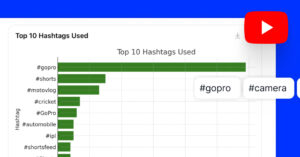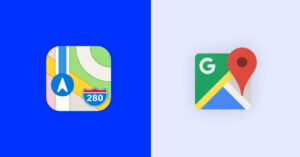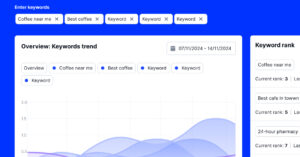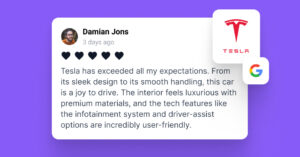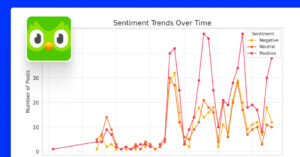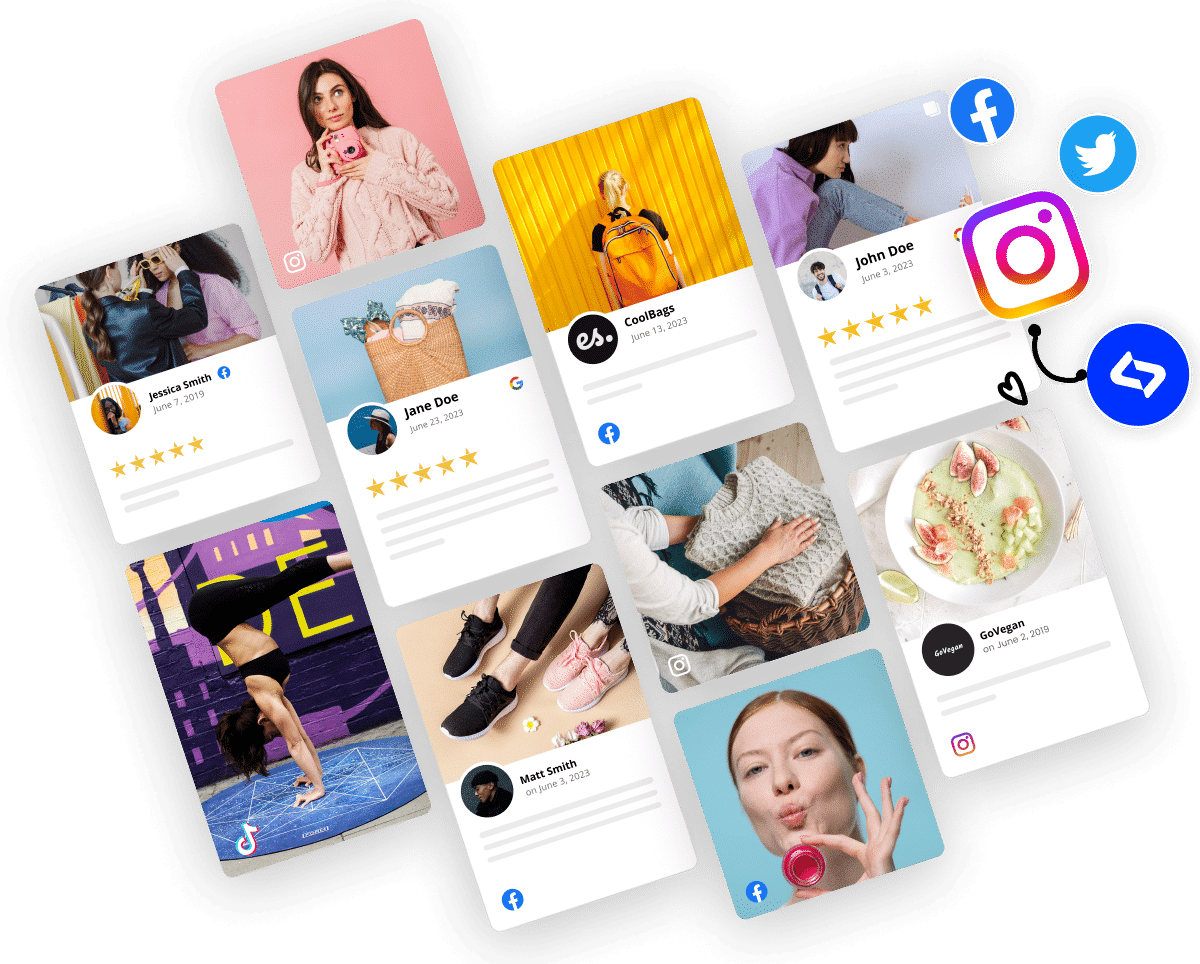Les organisateurs d'événements sont comme des abeilles occupées qui sautent d'une tâche à l'autre.
La définition des objectifs, l'établissement d'un budget, la sélection des équipes, le choix d'un lieu, la confirmation des sponsors et des orateurs ne sont que quelques-uns des aspects à prendre en compte pour que l'événement soit parfait.
Veiller à ce que tout le monde passe un bon moment, sur le plan de l'organisation, c'est une pression que les organisateurs d'événements ressentent en permanence sur leurs épaules.
Dans un monde parfait, nous serions tous des devins et nous ne devrions pas supposer ou deviner les besoins ou les désirs des participants.
Mais dans celui-ci, nous avons la chance d'avoir enquêtes de satisfactionCette méthode est très pratique pour recueillir des informations précieuses qui peuvent nous aider à mieux comprendre les participants à l'événement.
Le plus beau ? Nous pouvons recueillir des informations avant, pendant ou après l'événement.
Les enquêtes sur les événements peuvent vous aider à savoir ce que vos participants attendent de l'événement, comment ils se sont sentis pendant l'événement et si l'événement a répondu à leurs attentes ou non.
Dans cet article de blog, nous abordons les bases des enquêtes sur les événements et nous vous donnons des questions d'enquête simples mais très efficaces, ainsi que des conseils et des astuces supplémentaires pour mener une enquête utile.
Qu'y a-t-il à l'intérieur ?
- Qu'est-ce qu'une enquête de retour d'information sur un événement ?
- Pourquoi les enquêtes sur les événements sont-elles importantes ?
- Types d'enquêtes sur les événements
- Exemples de questions d'enquêtes sur les événements
- Marche à suivre pour réaliser une enquête sur l'événement pendant la Covid-19
- Conseils pour créer une enquête sur un événement
- Et s'ils ne répondent pas ?
Attachez votre ceinture, nous commençons.
Qu'est-ce qu'une enquête sur un événement ?

Il s'agit simplement d'une enquête destinée à recueillir des commentaires sur la qualité et l'efficacité globales de l'événement.
Les enquêtes de satisfaction peuvent porter sur différents aspects de l'événement, tels que l'organisation, le personnel ou les conférenciers.
Toutes ces informations et précieux renseignements peuvent vous aider à répondre à différents dilemmes que vous pourriez avoir au sujet de l'événement, par exemple si les participants sont satisfaits des orateurs, si l'endroit était bien situé ou s'il y avait suffisamment de personnel pour servir tout le monde.
Souvent, ces problèmes peuvent passer inaperçus jusqu'au tout début de l'événement.
La meilleure pratique consiste donc à demander l'avis de toutes les parties prenantes de l'événement et à s'assurer que l'on est conscient de tous les problèmes potentiels.
Les données obtenues à partir de l'enquête sur l'événement peuvent être facilement transformées en connaissances sur la satisfaction et les attentes des participants.
Utilisez ces données pour votre prochaine stratégie afin de créer une expérience positive pour vos participants à l'avenir.
Importance de enquêtes de satisfaction sur les événements
Les questions d'enquête sur les événements sont spécifiquement rédigées pour recueillir les pensées et les opinions de votre public cible, c'est-à-dire le public qui assistera, a assisté ou assiste à votre événement.
C'est pourquoi les enquêtes d'opinion sur les événements sont importantes pour comprendre ce que les participants apprécient ou n'apprécient pas à propos de l'événement.
Selon le blog Event Manager, 54% des organisateurs d'événements utilisent les enquêtes comme outil pour mesurer la satisfaction des participants et le succès global de l'événement.
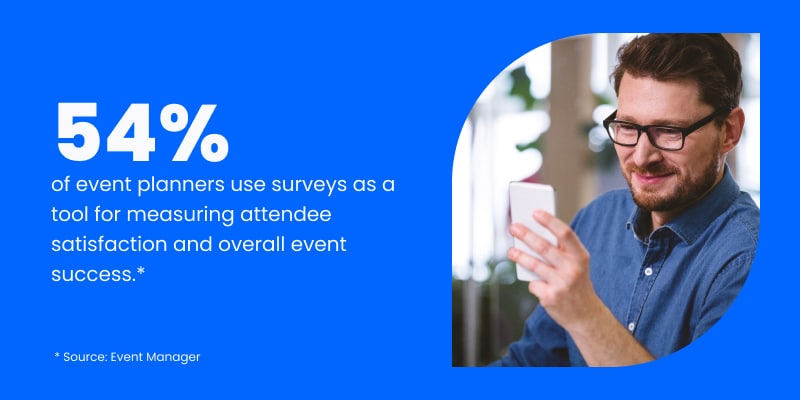
Si vous ne faites pas encore partie des planificateurs qui utilisent des enquêtes, c'est le moment de commencer.
Chacun a des impressions, des attentes et des idées différentes lorsqu'il participe à un événement. En posant des questions concrètes, vous pourriez donc tomber sur des suggestions intéressantes que vous pourrez utiliser dans le cadre de la stratégie de planification d'un événement pour organiser un événement réussi.
Types d'enquêtes sur les événements

Comme nous l'avons expliqué précédemment, les enquêtes sur les événements sont utilisées pour obtenir un retour d'information de la part de tous les participants à l'événement et pour améliorer l'organisation des événements futurs.
Vous pouvez poser une question et commencer à recueillir des commentaires avant d'organiser l'événement.
C'est à ce moment-là que les enquêtes préalables à l'événement entrent en jeu.
Enquêtes préalables à l'événement peut vous donner des indications importantes sur de nombreux aspects de l'organisation d'un événement, tels que le choix des aliments, le lieu ou les orateurs principaux.
Vous pouvez publier l'enquête sur les médias sociaux ou l'envoyer par courrier électronique et commencer à recueillir des commentaires immédiatement.
Voici quelques questions simples d'enquête pré-événement que vous pouvez utiliser pour recueillir des informations importantes auprès de votre public.
Comment avez-vous eu connaissance de cet événement ?
En posant cette question, vous pouvez savoir où votre public est le plus concentré et si vous avez besoin d'une meilleure promotion et d'un meilleur marketing pour l'événement.
Avez-vous des préférences alimentaires que les organisateurs de l'événement doivent connaître ?
Il n'y a pas d'événement sans nourriture, et les préférences alimentaires varient d'une personne à l'autre.
En tant qu'organisateur d'événements, la collecte de ces informations auprès des personnes interrogées est un élément essentiel de l'organisation.
Veillez à connaître les besoins alimentaires de vos participants afin de répondre parfaitement à leurs attentes.
Que pensez-vous du lieu de l'événement ?
Assurez-vous que toutes les personnes qui doivent être présentes peuvent accéder facilement au lieu en leur posant cette question dans une enquête préalable à l'événement.
Les informations sur l'événement étaient-elles suffisamment claires ??
Le public a-t-il compris le sujet, l'heure et le lieu de l'événement ?
Demandez-leur.
Voyez s'il y a des informations peu claires qui pourraient les déconcerter et supprimez-les à temps, afin qu'ils puissent être présents sans problème.
Un autre type d'enquête est le une enquête à mi-parcours.
L'enquête de mi-événement est menée pendant l'événement et peut vous aider à suivre la satisfaction des participants en temps réel.
Certains organisateurs d'événements évitent de recueillir des commentaires pendant l'événement, mais ce type d'enquête est idéal pour recueillir des commentaires pendant que l'expérience est encore "fraîche".
Voici quelques exemples que vous pouvez inclure dans les questions de votre enquête de mi-événement.
Quelle est votre appréciation du lieu ?
Vous pouvez poser cette question dans le cadre d'une enquête à mi-événement pour savoir quelle première impression vous avez faite.
Êtes-vous satisfait de l'enregistrement ?
Les organisateurs de l'événement doivent veiller à ce que le processus d'enregistrement se déroule rapidement et sans heurts.
Étant donné que ce sont les clients qui passent par le processus, il est préférable de leur demander s'ils sont satisfaits de l'enregistrement et d'obtenir un retour d'information précieux de leur point de vue.
Quelle est votre appréciation de l'audio ?
Les enquêtes à mi-événement sont des outils précieux pour détecter les problèmes potentiels qui peuvent survenir au cours de l'événement.
Demander un retour d'information peut vous aider à résoudre ces problèmes à temps et à faire en sorte que tout le monde vive une expérience agréable.
Le dernier type de questionnaire sur les événements est le l'enquête post-événement.
Les enquêtes post-événement permettent d'évaluer l'expérience globale des participants et de recueillir des commentaires constructifs.
Les évaluations post-événement comprennent des questions qui peuvent vous donner une idée plus précise de la façon dont le public a vécu l'événement.
Voici quelques questions que vous pouvez poser aux participants après l'événement.
Quelle est la probabilité que vous recommandiez cet événement à un ami ou à un collègue ?
Les résultats qui découlent de cette question courante mais fondamentale sont appelés le score de promoteur net.
Le NPS (net promoter score) est une méthode qui vous donnera rapidement et facilement les résultats de la mesure du niveau de satisfaction des participants.
Utilisez cette question pour obtenir une indication claire du succès de votre événement.
Qu'est-ce qui vous a le plus plu ou déplu dans l'événement ?
Une question d'enquête spécifique et claire qui vous aidera à identifier les forces et les faiblesses de l'événement.
Vos participants peuvent signaler qu'ils ont aimé le lieu mais pas l'emplacement.
C'est un point qu'il faut changer lors de l'organisation de futurs événements.
Sur la base de votre expérience de cette année, quelle est la probabilité que vous assistiez à cet événement l'année prochaine ??
Si quelqu'un est satisfait de votre travail aujourd'hui, il voudra probablement revenir vous voir un jour.
Un public fidèle est la meilleure récompense pour tous vos efforts, et il est dans votre intérêt d'adopter les aspects positifs et d'améliorer les aspects négatifs.
4. Autres exemples de questions d'enquêtes sur les événements
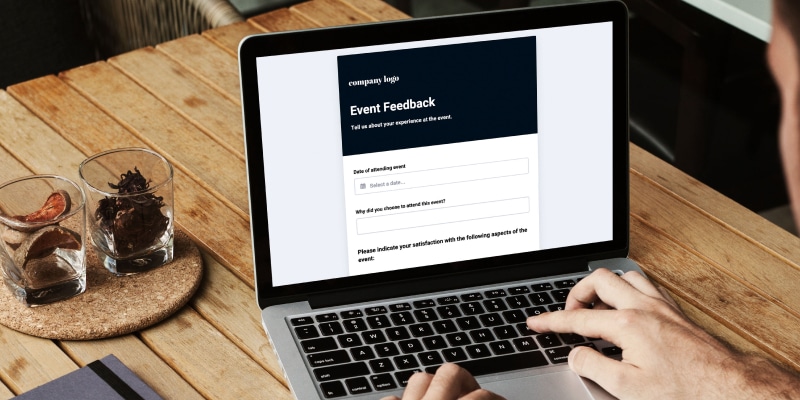
Au point 3, nous avons parlé des types d'enquêtes en fonction du moment où elles sont menées.
Cette section présente une liste plus large de questions d'enquête sur les événements que vous pouvez utiliser pour recueillir les réactions de votre public sur différents points clés de l'événement.
Vous pouvez utiliser différents types de questions, comme des questions ouvertes si vous voulez donner à votre public la possibilité de s'exprimer à sa manière, des questions simples avec des réponses oui/non, ou des questions à choix multiples.
Voici des exemples de chaque question :
Questions de l'enquête sur les événements (oui/non) :
- L'équipe chargée de l'événement a-t-elle réussi à répondre à toutes vos questions concernant l'événement ?
- Le personnel de l'événement était-il suffisamment accueillant ?
- C'était la première fois que vous participiez à l'un de nos événements ?
- Considérez-vous que l'événement est "réussi" ? Pourquoi ?
- Avez-vous participé à l'une des activités organisées après la conférence ?
- Pensez-vous que cet événement a atteint ses objectifs ?
- Pensez-vous qu'il y a eu des possibilités de mise en réseau ?
Questions ouvertes de l'enquête sur l'événement :
- Pourquoi avez-vous choisi de participer à cet événement ?
- Pourquoi avez-vous décidé de participer à cet événement ?
- Pensez-vous que cette conférence aura un effet sur votre travail futur ?
- Quel est le principal enseignement à tirer de cet événement ?
- Avez-vous rencontré des difficultés techniques pendant l'événement virtuel ?
Questions à choix multiples pour les enquêtes sur les événements :
- Selon vous, lequel des orateurs a fait la meilleure présentation ?
- Quel a été le meilleur moment de l'événement ?
- Le matériel couvert était pertinent pour mon rôle.
- Diriez-vous que l'événement a été trop long, trop court, à peu près correct ?
5. Marche à suivre pour réaliser l'enquête sur l'événement pendant la Covid-19
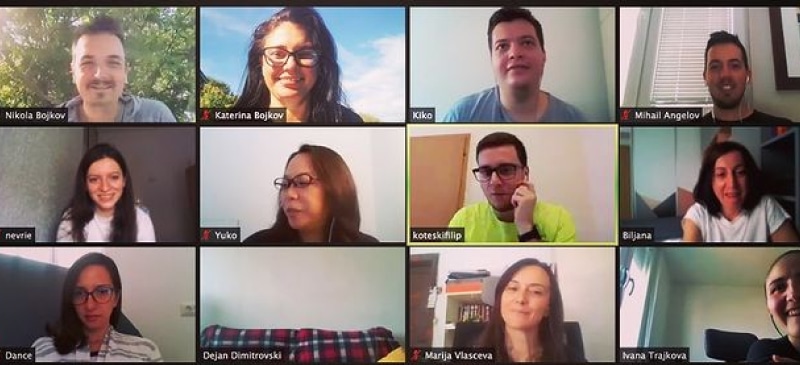
Covid-19 a provoqué des changements sans précédent dans presque toutes les industries, en particulier celles dont le fonctionnement dépendait de la présence physique des personnes.
De nombreux secteurs, dont celui de l'organisation d'événements, se sont tournés vers la pratique croissante des technologies de l'information en tant que méthode de travail de base.
Bien que les ordinateurs et l'internet aient grandement facilité la vie de Covid-19, le diagnostic des problèmes des clients potentiels n'est pas exclu.
Par conséquent, la pratique consistant à demander un retour d'information et à mener des enquêtes reste également valable lors d'événements virtuels.
Voici quelques façons de mener une enquête en ligne sur un événement et de tirer le meilleur parti des participants à votre événement.
1. Choisir le bon intervenants
Définissez les personnes dont vous avez besoin d'un retour d'information et préparez-vous pour chacune d'entre elles.
Oui, cela peut nécessiter des questions ou des formulaires différents, mais soyez indulgents, je peux vous expliquer.
Vous savez, il est évident que vous demanderez d'abord l'avis des participants, n'est-ce pas ? Mais nous négligeons parfois l'importance des réactions des bénévoles, des équipes des autres départements et des orateurs. Pensez à les approcher tous, et même si vous devez mettre en place un processus différent.
Vous pourriez apprendre des choses à des endroits peu évidents et vous aider à obtenir un meilleur événement la prochaine fois.
2. Informer les participants à l'événement à propos de l'enquête
Prévoyez de mentionner l'existence d'une enquête au cours de la partie "ménage" de l'événement. Mettez-le en évidence et ne le rendez pas trop obligatoire pour que les gens aient l'impression que vous êtes désespérément à la recherche d'un retour d'information.
Indiquez également à vos participants le temps nécessaire pour répondre à votre enquête. Chacun veut savoir combien de temps il passera à répondre aux questions.
3. Inciter à la soumission d'enquêtes
Habituellement, avant la crise du Covid-19, les événements en personne disposaient d'une technique étonnante pour inciter les participants à remplir une enquête.
Heureusement, la technologie est tellement avancée que certaines techniques peuvent être utilisées dans le monde virtuel également.
Il existe deux types d'incitations : les incitations monétaires et les incitations non monétaires.
Incitations monétaires
Les incitations monétaires peuvent prendre la forme d'argent liquide, de cartes-cadeaux, de chèques ou de coupons, et les incitations non monétaires peuvent être tout ce à quoi vous ne pouvez pas attribuer de valeur monétaire.
En fonction de votre budget, vous pouvez choisir celui qui vous convient le mieux.
Incitations non monétaires
Ou swag !
L'exécution simple de cette incitation est : 'Pour obtenir un swag, il fallait remplir un formulaire‘.
Dans les lieux physiques, le swag était généralement distribué dans une cabine de sortie où les gens remplissaient un formulaire et recevaient leur incitation. Mais si vous n'êtes pas en mesure de le faire en raison du passage en ligne, vous pouvez probablement procéder de la même manière, mais en tenant compte des frais de livraison.
Si votre budget ne vous permet pas d'offrir un cadeau à chaque personne interrogée, vous pouvez organiser une loterie et récompenser un heureux élu.
Encore une fois, comme mentionné ci-dessus, à chaque grande pause, montrez aux participants à l'événement que vous disposez d'un super swag post-événement qu'ils peuvent obtenir après avoir répondu à une enquête rapide.
6. Conseils pour créer une meilleure enquête sur les événements
- Ajouter des photos - Les photos sont un excellent moyen de rendre les enquêtes plus amusantes et d'obtenir un taux de réponse plus élevé.
- Calendrier - Si vous avez choisi d'utiliser l'enquête post-événement, veillez à l'envoyer au plus tard 24 heures après la fin de l'événement.
- Adaptée aux mobiles - Faites en sorte que votre enquête en ligne soit adaptée aux téléphones portables afin que les participants puissent y répondre rapidement, même lorsqu'ils sont en déplacement.
- Attention à la conception de l'enquête - Personnalisez votre modèle d'enquête sur les événements pour qu'il ressemble à votre marque et laisse une impression positive.
- Dites merci. - Créez une page de remerciement à la fin de votre enquête. C'est un moyen facile de remercier quelqu'un d'avoir pris le temps de répondre à votre enquête.
- Promouvoir votre prochain événement - Ne manquez pas l'occasion de promouvoir votre prochain événement. Cela peut vous permettre d'obtenir des informations sur l'intérêt général de votre public pour votre prochain événement.
7. Que faire s'ils ne répondent pas ?
La réponse la plus simple serait de faire un suivi avec une demande supplémentaire pour répondre à l'enquête.
- Veillez à être poli et à inclure un appel à l'action.
- Si vous envoyez l'enquête par courrier électronique, veillez à ce que la ligne d'objet soit attrayante.
- Indiquez toujours à vos répondants l'usage qui sera fait de leurs réponses.
- Essayez de segmenter votre public et de personnaliser les enquêtes.
- Veillez à ce que votre enquête soit courte, réfléchissez aux questions les plus importantes que vous souhaitez poser aux participants et tenez compte du temps qu'il faudra pour remplir le formulaire.
Résumé
Pensez à votre objectif.
Quel est l'objet de votre recherche ?
Faites un remue-méninges pour trouver les bonnes questions ou choisissez certaines des questions ci-dessus.
Choisissez le bon moment pour votre enquête et commencez à recueillir des informations.
Voici des informations supplémentaires 228 questions de l'enquête si vous avez besoin d'inspiration.

